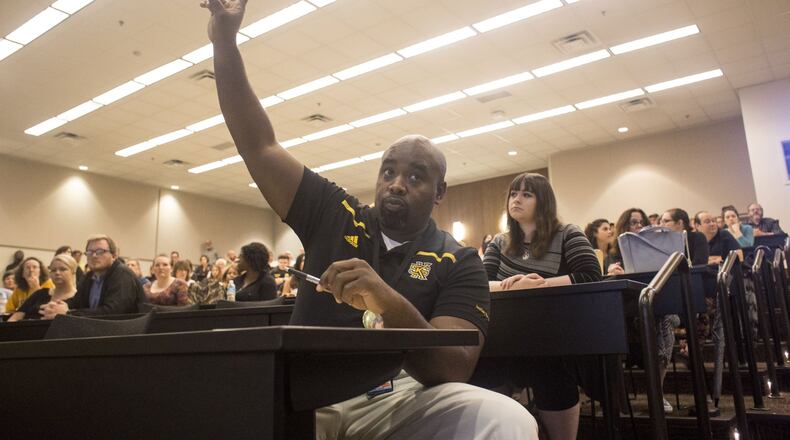A student was in a classroom, with a handgun on her in plain sight. An instructor called campus police.
Southern Crescent Technical College police found the student and told her the firearm had to be concealed, according to a campus police report. The student disagreed, and showed the officer a YouTube video to insist she was correct. The officer said she told the student she could not openly carry the firearm. The law says it has to be concealed. The officer advised her to put the weapon in her vehicle, and then she could go to class.
“She became upset, and stormed out of the building, kicking the front glass door to the medical building,” the campus police report said, before the student called the local police department.
Last July, a new Georgia law allowed individuals with state licensed permits to carry firearms on parts of public college campuses. A year later, as this March encounter showed, there's still ample confusion about the law.
Since “campus carry” went into effect, the 22 colleges in Technical College System of Georgia have reported eight incidents in which someone carried a firearm in an unauthorized location. The University System of Georgia, which includes the state’s largest public campuses, recorded 15 violations of the campus-carry law. Both systems sent data to The Atlanta Journal-Constitution in response to open records requests.
In some instances, students left rifles in their vehicles in locations on campus where firearms aren’t permitted. The students had licenses to carry the guns and explained they’re used for hunting. One Southern Crescent student carrying an exposed handgun in front of a campus building “explained he did not know the law,” according to a police report.
Anyone with a concealed-weapon permit is allowed carry firearms on all public college and university campuses, with exceptions that include dormitories, fraternity and sorority houses, and buildings used for athletic events. On-campus child-care centers are also excluded, as are areas on campus where high school students attend class. While firearms cannot be carried inside athletics venues, people can carry them when tailgating before a game.
The confusion frequently caused concern on some campuses. In one case in January, a loaded Smith & Wesson handgun was found in a drawstring bag in the University of Georgia’s Ramsey Center, according to a police report the Campaign To Keep Guns Off Campus shared with the AJC. Campus police at the time couldn’t find the gun’s owner.
“This unknown individual’s disregard constituted a gross deviation from the standard of care which a reasonable person would exercise when carrying a firearm,” the report said. “There were multiple people inside the room where the firearm was found during the time of this incident.”
The law’s critics say such incidents proved why the law is flawed. Campus-carry supporters counter by saying the law is serving its purpose. No shootings that have killed multiple people have taken place on any Georgia campuses since the law took effect, and many students who lawfully carry guns on campus feel safer.
State House of Representatives Public Safety and Homeland Security Chairman Alan Powell, R-Hartwell, said the only complaint he’s heard about the campus-carry law is that it didn’t go far enough.
“I hear objections from some of the college professors that they can’t carry their personal weapons into their offices,” he said. “They think it’s discriminatory.”
Powell said continuing to ban carrying concealed weapons in certain parts of campus was necessary to get the bill through the Legislature last year. Still, he said he’s not sure there’s a need to revisit the law.
“There haven’t been any problems besides (unhappy professors), but I don’t know that we can gather support to go that far,” he said.
Critics aren’t planning efforts to change or amend the law. For now, their focus is to educate people about it.
Georgia is one of 39 states that allow concealed-carry on public campuses or guns in locked vehicles or lets campuses determine whether people can carry firearms, according to Armed Campuses, a website created by organizations against guns on campus.
Six veteran Georgia professors filed a suit requesting an injunction in Fulton County Superior Court in September to stop the campus-carry law, saying it's dangerous to students and faculty and unconstitutional.
Their concerns included the potential safety hazard if a firearm is accidentally discharged in areas with hazardous materials. The judge has not ruled on the complaint.
Andy Pelosi, executive director of the Campaign To Keep Guns Off Campus, said the concern raised by the professors is his greatest fear about Georgia’s law.
“If a gun goes off, you have the potential for some serious damage,” Pelosi said.
Georgia lawmakers in 2016 passed a law allowing stun guns – dubbed “campus carry lite” – to give people an option if they were too young to legally carry a concealed weapon. Georgians must be 21 to carry concealed weapons, and most of the traditional students on campus are younger than that.
The stun gun bill’s lead sponsor, state Rep. Buzz Brockway, R-Lawrenceville, said it gives people who may have a weapon permit but don’t want to carry their guns another alternative to protect themselves. Public college system officials said they had no records of instances where someone used a stun gun on campus.
“I said at the time that I pray no student has to use it,” Brockway said. “I hope no student ever finds themselves in that situation, but it’s there if they need it.”
These are the places firearms cannot be carried on Georgia’s public college campuses:
- athletic venues, such as football stadiums, basketball arenas and gymnasiums
- student dormitories
- rooms used for child care or preschool
- classrooms used to teach high school students in dual enrollment programs
- faculty, staff and administrative offices
- rooms where disciplinary hearings are held
Keep Reading
The Latest
Featured



